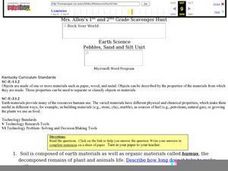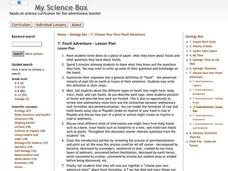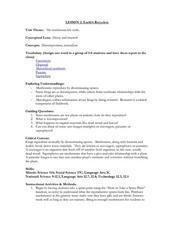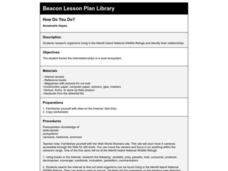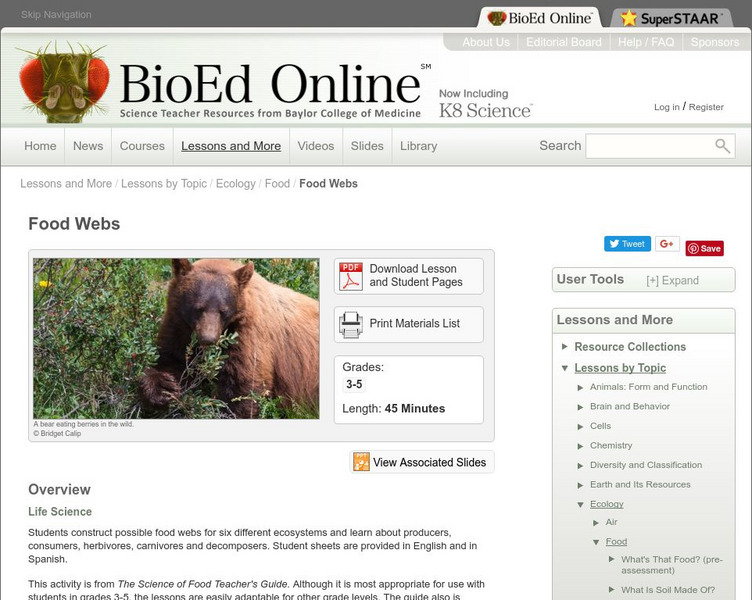Curated OER
The Flow of Energy Song
Students perform the lyrics and instrumental parts for the "Flow of Energy song." They create photo images which represent consumers, producers, decomposers, and scavengers. These images will be inserted in an iMovie of the class...
Curated OER
The Mechanisms of Decay and Decomposition
Eighth graders study how all living things die. They are introduced tot he life cycle and the concept of an ecosystem. Students have a introductory exposure to trophic levels (producer-consumer-decomposer) in the environment.
University of Kentucky
Beneficial Bug Scavenger Hunt
Many people think of bugs as annoying pests to be squashed, but most insects and spiders are beneficial, eating the actual pests or pollinating plants. After reviewing some of the common bugs in your area (they may differ from those...
Curated OER
Populations and Ecosystems
Sixth graders define terms prey, predator, and scavenger, describe predator-prey relationship, discuss effects of a lack of predators in an environment, and separate the role of the scavenger from that of the predator.
Curated OER
Rock Your World
Young scholars define soil, dirt, clay, silt, and sand. They conduct an online scavenger hunt, answer pre-written online questions on a piece of paper, and play the Earth Materials Game after completing the scavenger hunt.
Pennsylvania Department of Education
A Geometric Scavenger Hunt
Fifth graders connect their knowledge of polygons and polyhedrons. In this geometric shapes instructional activity, 5th graders identify and classify two- and three-dimensional objects. Students construct a polyhedron out of polygons and...
Curated OER
Food Web
Students identify producers and consumers, including scavengers and decomposers, and discuss role each plays in food web. They then make diagram of possible food chain that might include skull pictured on Montana's quarter, and...
Curated OER
Prairie Food Chains & Webs
Students complete a food chain. In this ecosystem lesson, students learn about producers, consumers and decomposers. Students identify herbivores, carnivores and omnivores and complete two worksheets.
Curated OER
Discovering Local Food Chains
Fourth graders study about food chains. With the assistance of a local biologist, Students hike the school trail system. They explore ecosystem and collect data by charting the organisms found and identifying the energy source. They...
Desert Museum
Daisy Ecology
Here's a fine lesson that combines poetry with life sciences. Learners carefully listen to a poem that's all about a food chain. As the poem is read, learners name the producer, the herbivore, the carnivore, and the omnivore. Lots of...
Curated OER
Species Interactions
Students research desert species to find where it lives, what it eats, and what species it interacts with directly. Upon completion of research, students construct a web of all the species as a class. This emphasizes the role each...
Curated OER
Nature's Recycling Program
Students identify what materials make up compost. In this science of recycling lesson, students explain the benefits of composting determine how compost is a good plant fertilizer.
Curated OER
The Circle of Life
Fourth graders examine how the different organisms living in an ecosystem affect one another. In groups, they research a specific ecosystem and present their findings to the class based on the type of organisms found in it. To end the...
Curated OER
Fossil Adventure
Students create a book about the process of a dinosaur becoming a fossil. In this earth science lesson plan, students are taught about fossils and create a book that tells what happened to a dinosaur's bones after they die.
Curated OER
The Flow of Energy Song
Young scholars recite/perform the lyrics of Jim Walters "The Flow of Energy" song. They incorporate instrumental accompaniment parts for the song as well. In addition, they produce a slide show to explain the reasoning of the lesson....
Curated OER
Energy Flow in Ecosystems
Middle schoolers, in groups, create a slide show about the ecosystem and answer critical thinking questions based on their research.
Curated OER
My Biotic Creation
Eighth graders explore different ecosystems. In this ecosystem survival lesson conditions lesson students create their own fictional creature.
Curated OER
Fossil Adventure
Students work as a class to write a general definition of fossil based on their discussion and examine pictures of the different types of fossils. Once discussion is complete, they write and illustrate a book about a T Rex that has died...
Curated OER
Forest Ecology
Students examine the different plants and animals in British Columbia. In this forest ecology instructional activity students explore how ecosystems work, classify animals and investigate food webs and chains.
Curated OER
Ecology - Ecosystem
Third graders research ecosystems, the work of ecologists, John Muir's contribution to the environment and an endangered species of their choice. They read books, participate in discussions, and write reports.
Curated OER
Earth's Recyclers
Students work together in groups to report on different topics related to decomposition. They answer questions and share their answers with the class. They discuss any topic that is unclear.
Curated OER
How Do You Do?
Seventh graders research organisms in the Merritt Island National Wildlife Refuge. They create a picture book demonstrating their understanding of relationships.
Curated OER
March Market
Students role play a living wetland food web. They trace the food web associated with the items in their lunch.
BioEd Online
Bio Ed Online: Food Webs
Students construct possible food webs for six different ecosystems as they learn about the roles of producers, consumers, herbivores, carnivores and decomposers.




